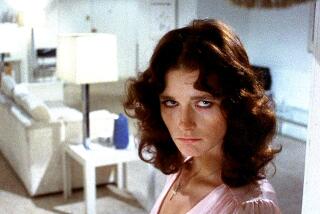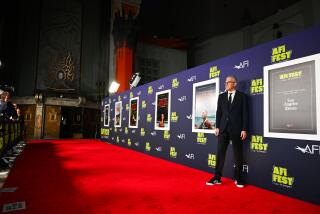An Entranced Audience Ready for Hitchcock’s Centenary
- Share via
What is there left to say about Alfred Hitchcock as we approach the much anticipated 100th anniversary of the legendary filmmaker’s birth (fittingly on Friday, Aug. 13)?
Quite a lot, actually, since we’ve barely scratched the surface of Hitchcock’s narrative genius--his true legacy--despite all the books and articles written about him over the years. The “Master of Suspense” label has never done him complete justice; his films are more than the sum of those celebrated set pieces (such as the crop-dusting chase in “North by Northwest” or the Albert Hall assassination attempt in both versions of “The Man Who Knew Too Much”) that defined his reputation.
Yet even this doesn’t fully explain the deep attachment we have for Hitchcock’s films--a psychic bond, really--which has more to do with the powerful emotions they stir within us, as famed French director Francois Truffaut once proclaimed. In fact, this may be the key to understanding Hitchcock as we revisit the films again, nearly 20 years after his death. Watching these films is like stepping in and out of one continuous dream about our darkest and most primal fears, with Hitch’s macabre English wit contributing to the disequilibrium.
The centenary celebration is all the more special because relatively few of Hitchcock’s films have been revived on the big screen since the advent of video--no other filmmaker possesses so many popular films that demand to be seen with an entranced audience.
The festivities began here in town on Monday with a screening of “The Man Who Knew Too Much” remake at the Egyptian Theatre sponsored by the American Cinematheque. Today, Universal Pictures commences a three-week tribute at the Nuart Theater, starting with an entire week of “Psycho.”
The series of all new prints continues with half a dozen odd pairings: “The Birds” (looking particularly good) and “The Trouble With Harry,” “Shadow of a Doubt” and “Saboteur,” “The Man Who Knew Too Much” and “Torn Curtain,” “Marnie” and “Rope,” “Vertigo” and “Topaz” and ‘Frenzy” and “Family Plot.”
On Hitchcock’s birthday, the Academy of Motion Picture Arts and Sciences will host an evening of rare film clips and outtakes from the director’s private collection it houses as well as a pictorial exhibition of special materials on display through October. The Museum of Television and Radio will pay its own tribute from Aug. 13 to Sept. 11 with a series of 30 “Alfred Hitchcock Presents” TV episodes that aired from 1955 to 1965.
Universal, meanwhile, will sponsor its own centennial birthday celebration with a glitzy gathering of Hitchcock alumni on the studio lot, including the premiere screening of a new Encore cable documentary, “The Alfred Hitchcock Centennial,” which will air that night (Aug. 13) on the cable station. This will be followed by an academy screening of “Rebecca,” the best picture winner from 1940 on Aug. 20 with a stunning new print courtesy of Walt Disney’s library restoration.
Then the Los Angeles County Museum of Art will host a more thematic tribute over three consecutive weekends beginning Aug. 27, including three British favorites, “The 39 Steps,” “Young and Innocent” and “The Lady Vanishes,” as well as “Strangers on a Train” and a brand-new print of ‘Notorious” (also courtesy of Disney).
The topper, of course, should be the Nov. 19 theatrical premiere of the fully restored “Rear Window,” the latest project by Robert Harris and James Katz in conjunction with Universal. As with their triumphant ‘Vertigo” restoration, we will finally be able to view this masterpiece in all its visual splendor.
Something Painterly, Musical About It All
From the very beginning of his silent career, Hitchcock gave us a totally unique experience in film: frightening, thrilling, melodramatic and comic, sometimes all at the same time. There was something painterly and musical about it all, yet completely cinematic.
“He’s become a figure of speech,” says Andrew Sarris, the influential Village Voice critic and historian who touted Hitchcock’s artistry long before it was fashionable in this country. “I never tire of looking at him. I can look at ‘Shadow of a Doubt’ or ‘Vertigo’ any day. He could tell a story pictorially and make us feel something very exciting. He had a real knowledge of people and was also prophetic: He was ahead of people in showing us the darkness to come.”
Hitchcock also had a real understanding of the Hollywood star system--and the way audiences identified with them--which is why he coaxed some of the best performances ever out of Jimmy Stewart, Cary Grant, Ingrid Bergman, Joan Fontaine, Claude Rains, Robert Walker, Joseph Cotten, Teresa Wright, Janet Leigh and Anthony Perkins.
In a funny way, last year’s “Psycho” remake merely reaffirms Hitchcock’s narrative genius because of Gus Van Sant’s inability to reproduce the terrifying uneasiness that ran through the original--not only in the famous set pieces but in the intimate scenes as well. Van Sant’s motel love tryst contains none of the desperation or carnal lust conveyed by Leigh or John Gavin. The rhythm is off; it seems rushed.
There are emotional complexities to be found in many Hitchcock films, including “Shadow of a Doubt,” one of his personal favorites. In this wonderful thriller about a telepathic bond between a murderous uncle (Cotten) and his idealistic niece (Wright), two dinner table encounters reveal everything we need to know about this small-town family through the counterpoint of spoken and unspoken communication. The neuroses are written on their faces in a rich tableau of human frailty.
Truffaut was also prophetic: He warned that Hitchcock’s disciples would be unable to grasp his gift for conveying subtle emotions. How many modern directors could capture the painful look in Claude Rains’ eyes as he loses Ingrid Bergman to Cary Grant during that long staircase descent at the end of “Notorious,” or the compassionate close-up of Barbara Bel Geddes at the beginning of “Vertigo” that reveals her unrequited love for Stewart?
“It now seems that the kinds of movies Hitch made are more [popular] than ever, but not the way he made them,” suggests director and film historian Peter Bogdanovich, who interviewed the director in the early 1960s while organizing the first public retrospective of his films at the Museum of Modern Art in New York.
“He left a heritage largely misunderstood, except for the most obvious subject matter,” Bogdanovich said. “Directors today opt for shock or surprise, which is much easier to fashion than suspense, which is much harder. The former is achieved through the denial of information, and the latter through the giving of information. But Hitch’s technique was always at the service of something larger and more important.”
In other words, for the man who knew so much, it was always about people.
*
* “Universal Hitchcock,” today-May 6 at the Nuart Theater, 11272 Santa Monica Blvd., “Psycho” plays today-April 22; other Hitchock films including “The Birds,” “Shadow of a Doubt,” “Vertigo” and “Frenzy” screen from April 22 until the end of the festival. (310) 478-6379.
More to Read
Only good movies
Get the Indie Focus newsletter, Mark Olsen's weekly guide to the world of cinema.
You may occasionally receive promotional content from the Los Angeles Times.









